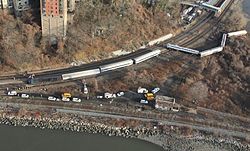
The recent fire under the Park Avenue viaduct in Harlem, which disrupted commutes of a quarter million Metro-North riders got me thinking: our aging, crumbling and vulnerable transportation infrastructure is close to collapse, and the effects of such failure could be catastrophic. Consider this track-record:
June 1983: Inadequate inspections and repairs cause the collapse of the Mianus River Bridge on I-95 in Greenwich. Three people were killed and three others injured. For almost five months, 80,000 daily vehicles had to detour through city streets.
March 2004: An oil tanker crashes on I-95 in Bridgeport and the ensuing fire is hot enough to melt steel supports on the Howard Avenue overpass. Traffic was disrupted for a week.
September 2013: Con-Ed plans to replace a crucial electric feeder cable for Metro-North in the Bronx. The railroad decides to forgo the $1 million cost of a temporary back-up cable and the main cable fails, disrupting train service for weeks, both on Metro-North and Amtrak.
June 2014: Twice in one week the Walk Bridge in South Norwalk (built in 1896) won’t close, cutting all rail service between New York and Boston. Cost of replacement will be more than $450 million.
May 2016: Illegally stored chemicals and propane tanks at a gardening center under the Park Ave. viaduct catch fire. The flames’ heat melts steel girders, cutting all train service out of Grand Central Terminal and stranding thousands. Limited train service in the following days leads to subway-like crowding and lengthy delays.
Mind you, this list does not include fatal accidents and disruptions caused by human error, like the Metro-North crash at Spuyten Duyvil that killed four.
Our lives, our jobs and our economy rely on safe, dependable transportation. But when the roads we drive and the rails we ride are museum pieces or go uninspected and unrepaired, we are dangling by a thread.
A single fire, whether caused by accident or act of terrorism, can bring down our infrastructure in an instant, cutting us off from work for days and costing our economy billions.
What can be done? Safety inspections by engineers and fire departments looking to prevent disaster are obvious. Better enforcement of speed limits and safety are as well. But prevention of accidents cannot make up for decades of neglect in reinvestment in our roads, rails and bridges.
The American Society of Civil Engineers’ annual infrastructure report card gives the US a D+. They estimate we will need to spend $3.6 trillion to get things back into good shape … less than the cost of the last 15 years of US fighting in the Middle East and Afghanistan.
As the old auto-repair ad used to say, “You can pay me now or you can pay me later”. But sooner or later, we will have to pay.

About the author: Jim Cameron is founder of The Commuter Action Group, and a member of the Darien RTM. The opinions expressed in this column are only his own. You can reach him at CommuterActionGroup@gmail.com
For a full collection of “Talking Transportation” columns, visit www.talkingtransportation.blogspot.com